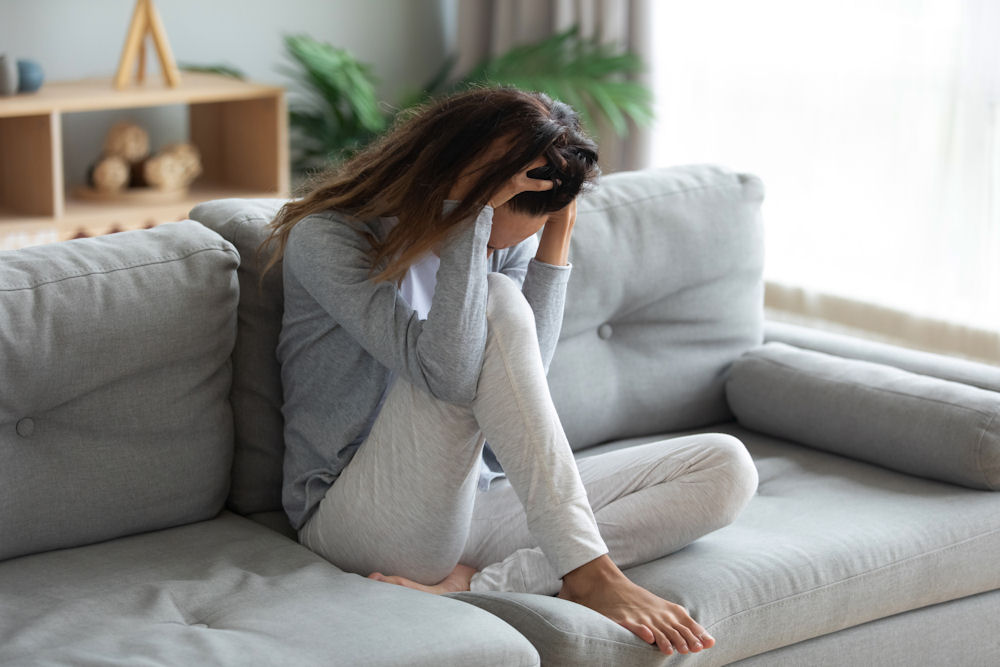Understanding Mood Disorders and Mental Illness
Do you struggle with depression or anxiety? You are not alone. Millions of people worldwide experience these mental health conditions. Depression is a mood disorder that can cause feelings of sadness, low energy, and loss of interest in activities. Anxiety disorders, on the other hand, are characterized by excessive worry, fear, and nervousness.
 Mental health issues can be caused by a combination of factors, including genetics, environmental factors, and life experiences. It is essential to seek professional help if you are experiencing symptoms of depression or anxiety. A mental health professional can help you develop a treatment plan that may include therapy, medication, and lifestyle changes.
Mental health issues can be caused by a combination of factors, including genetics, environmental factors, and life experiences. It is essential to seek professional help if you are experiencing symptoms of depression or anxiety. A mental health professional can help you develop a treatment plan that may include therapy, medication, and lifestyle changes.
Major depressive disorder (MDD) and generalized anxiety disorder (GAD) are two of the most common mental illnesses. MDD affects around 7% of adults in the US, while GAD affects around 3% of the population. However, these disorders are treatable, and many people recover with appropriate treatment.
If you are experiencing symptoms of depression or anxiety, it is crucial to seek help from a mental health professional. They can help you develop a treatment plan that may include therapy, medication, and lifestyle changes. In some cases, vitamins and minerals may also be helpful in managing symptoms.
Remember that everyone’s journey with mental health is unique, and there is no one-size-fits-all solution. However, with the right support and treatment, it is possible to manage and overcome depression and anxiety.
Role of Vitamins and Minerals
What vitamins can help with anxiety and depression? While they are not a cure-all solution, research has shown that certain vitamins and minerals can help alleviate symptoms of anxiety and depression.
Vitamin D, for example, is essential for maintaining healthy brain function and has been linked to improved mood. B vitamins, including B1, B6, B9 (folic acid), and B12, are also important for brain health and can help reduce symptoms of depression and anxiety. Low levels of folate, a type of B vitamin, have been linked to depression.
Magnesium is another mineral that can help reduce anxiety and promote relaxation. It plays a key role in regulating the nervous system and can help ease symptoms of anxiety and depression.
In addition, research has shown that deficiencies in certain vitamins and minerals can contribute to symptoms of anxiety and depression. For example, low levels of zinc and calcium have been linked to increased anxiety, while a deficiency in vitamin B3 (niacin) can lead to depression.
How Does Your Diet Affect Your Mental Health?
Your diet can have a significant impact on your mental health, including anxiety and depression. Eating a balanced diet with plenty of fruits, vegetables, lean proteins, and whole grains can help improve your mood and reduce symptoms of anxiety and depression.
Fish, especially fatty fish like tuna and salmon, are rich in omega-3 fatty acids, which have been shown to reduce inflammation and improve brain function. If you’re vegan or don’t eat fish, consider taking a dietary supplement with omega-3s or adding other sources of omega-3s to your diet such as flaxseed, chia seeds, or walnuts.
Poultry, beans, and cereals are all good sources of vitamin B6, which plays a crucial role in producing neurotransmitters like serotonin and dopamine. These neurotransmitters help regulate mood and can improve symptoms of anxiety and depression.
Eggs are a great source of vitamin D, which has been linked to improved mood and decreased symptoms of depression. Broccoli and yeast are also good sources of vitamin D.
In addition to eating a balanced diet, it’s important to pay attention to your fat intake. Fats, especially unhealthy fats like trans fats, have been linked to increased inflammation and a higher risk of depression. Instead, focus on healthy fats like those found in fatty fish, nuts, and seeds.
Can Sunlight and Vitamin D Help with Anxiety and Depression?
Sunlight is a natural source of Vitamin D, a nutrient that plays a vital role in our overall health. Vitamin D helps regulate the absorption of calcium and phosphorus, which are essential for maintaining strong bones. But did you know that Vitamin D also plays a crucial role in our mental health?
Exposure to sunlight triggers the production of Vitamin D in our skin. Vitamin D helps regulate mood, and a deficiency in it has been linked to an increased risk of depression and anxiety. Research suggests that people who live in areas with less sunlight are more likely to experience depression and anxiety.
While it is essential to protect your skin from the harmful effects of the sun, it is also important to get enough sunlight to maintain healthy Vitamin D levels. Spending just 10-15 minutes outside in the sun each day can help boost your Vitamin D levels and improve your mood.
If you live in an area with limited sunlight, or if you have a Vitamin D deficiency, you can also get Vitamin D from certain foods, such as fatty fish and fortified dairy products. Additionally, Vitamin D supplements are available over-the-counter and can help boost your levels.
Incorporating sunlight exposure and Vitamin D-rich foods into your daily routine can be an effective way to support your mental health. However, if you are experiencing symptoms of depression or anxiety, it is essential to seek professional help from a healthcare provider or mental health professional.
How can specific nutrients help with anxiety and depression?
Anxiety and depression are complex conditions that can be influenced by a variety of factors, including genetic, environmental, and lifestyle factors. While there is no single nutrient that can cure these conditions, certain vitamins and minerals have been shown to play a role in mood regulation, brain function, and immune function, all of which can have an impact on anxiety and depression.
Mood regulation
Neurotransmitters such as serotonin, dopamine, and norepinephrine are involved in the regulation of mood, appetite, and cognition. Several nutrients are necessary for the production of these neurotransmitters, including tryptophan, vitamin B6, vitamin B12, folic acid, phenylalanine, tyrosine, histidine, choline, and glutamic acid.
Brain function
Omega-3 fatty acids, found in fatty fish like wild Alaskan salmon, have been linked to lowered anxiety. Zinc, found in oysters, cashews, liver, beef, and egg yolks, has also been shown to have a positive effect on anxiety. Thiamine (vitamin B1), niacinamide (vitamin B3), and pyridoxine (vitamin B6) have all been used to successfully treat many individuals with anxiety disorders and other mental health-related conditions.
Immune function
Vitamins and minerals, such as vitamin C, vitamin E, and zinc, are important for immune function and can help protect against oxidative stress, which has been linked to anxiety and depression.
While these nutrients can be obtained through a balanced diet, some individuals may benefit from supplementation under the guidance of a healthcare professional. It is important to note that self-diagnosis and self-treatment can be dangerous and should be avoided.
Herbal Remedies and Alternatives
What herbal remedies and alternatives can help with anxiety and depression? Here are some options to consider:
Kava
Kava is a plant that is native to the South Pacific Islands. It has been used for centuries to help with anxiety, stress, and depression. Kava contains compounds called kavalactones, which have been shown to have a calming effect on the body. Some studies have also found that kava can be as effective as prescription medications for anxiety and depression. However, kava can have side effects and may interact with other medications, so it’s important to talk to your doctor before taking it.
Valerian root
Valerian root is a plant that has been used for centuries to help with anxiety, stress, and insomnia. It contains compounds that have a calming effect on the body, and some studies have found that it can be effective for anxiety and depression. However, valerian root can have side effects and may interact with other medications, so it’s important to talk to your doctor before taking it.
St. John’s Wort
St. John’s Wort is a plant that has been used for centuries to help with depression. It contains compounds that have been shown to have a positive effect on mood, and some studies have found that it can be as effective as prescription medications for mild to moderate depression. However, St. John’s Wort can interact with other medications, so it’s important to talk to your doctor before taking it.
Lavender
Lavender is a plant that has been used for centuries to help with anxiety, stress, and insomnia. It contains compounds that have a calming effect on the body, and some studies have found that it can be effective for anxiety and depression. Lavender can be used in a variety of ways, including as an essential oil, in tea, or in a bath. However, lavender can interact with other medications, so it’s important to talk to your doctor before using it.
L-theanine
L-theanine is an amino acid that is found in green tea. It has been shown to have a calming effect on the body and may help with anxiety and depression. Some studies have found that l-theanine can increase levels of serotonin and dopamine, which are neurotransmitters that affect mood. However, l-theanine can interact with other medications, so it’s important to talk to your doctor before taking it.
Risks and Considerations
 When considering taking vitamins for anxiety and depression, it’s important to understand the potential risks and considerations. While vitamins can be an effective addition to treatment, they should not be used as a replacement for prescribed medications or therapy.
When considering taking vitamins for anxiety and depression, it’s important to understand the potential risks and considerations. While vitamins can be an effective addition to treatment, they should not be used as a replacement for prescribed medications or therapy.
One risk to keep in mind is the potential for interactions with other medications or supplements. For example, taking high doses of vitamin B6 can interfere with certain antidepressants, and St. John’s Wort can interact with many medications, including birth control pills and blood thinners. It’s important to talk to your healthcare provider before starting any new vitamin regimen.
Another consideration is the efficacy of vitamins in treating anxiety and depression. While some studies have shown promising results, the evidence is not yet conclusive. Additionally, the optimal blood levels of certain vitamins for mental health are not yet well-established.
It’s also important to note that taking high doses of certain vitamins can be harmful. For example, excessive vitamin D intake can lead to hypercalcemia, a condition where there is too much calcium in the blood, which can cause nausea, vomiting, and kidney problems.
While vitamins can be a helpful addition to treatment for anxiety and depression, it’s important to approach their use with caution and under the guidance of a healthcare provider.


